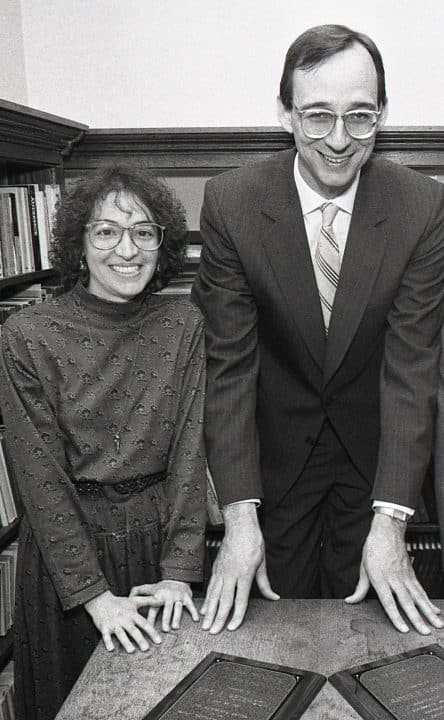New Scholarship Celebrates the Power of Stories

Professors Emeriti Kristin M. Langellier and Eric E. Peterson share many stories through the unique intersection of their personal and professional lives. Married since 1979, both taught communication courses at the University of Maine from 1980 until their retirement in 2016. Langellier’s scholarship and teaching encompassed performance studies and narrative communication; Peterson focused on media consumption, critical and cultural communication studies, and qualitative research methods.
Interdisciplinary awareness marks both careers. Langellier’s career includes contributions to Women’s and Gender Studies, Franco American Studies, and the interdisciplinary, community-based collaborative Somali Narrative Project. Peterson’s scholarship draws upon traditions in the human sciences to examine communication phenomena that range from popular culture and identity politics to pedagogy and classroom communication.
Both Peterson and Langellier have strong memories of their early days at UMaine. Kristin notes, “We had very good support from our department. I have a distinct memory of being mentored.” She is quick to recognize the late Dwayne VanRheenen, who served as department chair during their formative years in Orono. Describing their mentor’s emphasis on community rather than individualism within academe they both note, “Dwayne always came from the ‘we’ rather than the ‘I’ and emphasized what each of us could contribute to our department.”
Given the breadth of their interests, it is no surprise that both share a deep interest in storytelling, as demonstrated in the book they co-authored in 2004, “Storytelling in Daily Life.” Langellier is quick to point out that stories have long had an important role in her life, dating back to her childhood as one of ten siblings. “To listen to a story is a gift; to tell a story is a gift,” Langellier said. “It makes people present to each other.”
In their retirement, the couple enjoys traveling to Brunswick every Friday to spend time with their grandson, Jack. Not surprisingly, they are working on an album of photographs and stories for him.
Philanthropy is another common theme in their lives. Peterson and Langellier have supported Women’s Basketball, the Honors College, the Schonberger Peace and Social Justice Lecture, and the Orono Bog Boardwalk. Peterson explains, “The university has been our center and our community. Most of the funds we support are an extension of our teaching and research.” Women’s basketball, he notes, is naturally of interest to two Midwesterners.
As is often the case, colleagues, friends, and former students have also contributed to the Kristin M. Langellier and Eric E. Peterson Scholarship Fund that will benefit junior and senior Communication majors with a GPA of at least 3.0 and demonstrated financial need. One of the donors is Zornitsa Dimova Keremidchieva ’99G, ’01G, who has two master’s degrees from the University of Maine: one in English with a concentration in Composition, Rhetoric, and Pedagogy and a second one in Communication Studies. Originally from Bulgaria, Keremidchieva describes Peterson and Langellier as “among the most careful and thoughtful scholars I have ever worked with,” who taught her an “ethos of caring” while providing her with a map of the field and a compass that continue to serve her every day. Keremidchieva will soon begin a tenure-track position at the University of Minnesota, where she looks forward to “paying it forward” by mentoring her own students. Wistful about her formative experience at UMaine, she is quick to add, “I will never be able to give back enough. My debt (to faculty members like Langellier and Peterson) is bigger than can ever be repaid.”
Photo: Kristin M. Langellier and Eric E. Peterson c. 1991
Make a gift to the Kristin M. Langellier and Eric E. Peterson Scholarship Fund

